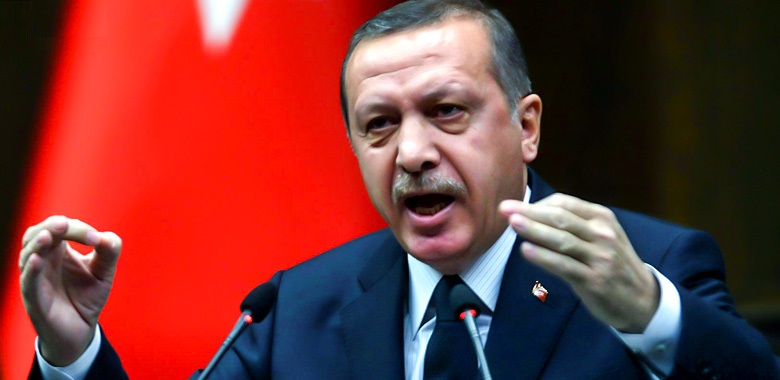AhlulBayt News Agency - Erdogan and Davutoglu, as the architects of modern Turkey, in recent years had put zero tension policy on the agenda of their foreign policy. However, after a while, as Turkey got involved in Syrian crisis, and began to interfere with the Syrian affairs and granted its full support for terrorist groups to overthrow Bashar al-Assad, actually it did adopt a policy other than what it had proclaimed.
With regard to domestic policies of the Turkish government, Erdogan’s performance could be considered as one of the most totalitarian ones in recent history of Turkey. The outcomes of both domestic and foreign policies of Justice and Development Party (AKP) are clearly seen today.
Turkey-based Tody's zaman website cited Bertelsmann Stiftung Transformation Index (BTI) as saying that Turkey has left its path of democratization under President Recep Tayyip Erdoğan.
BTI monitors the quality of democracy, market economy and governance in developing countries.
The BTI's Regional Findings Report states that Turkey “was downgraded due to its increasingly authoritarian governance style,” alluding to the increasingly severe pressure of President Erdogan and the Justice and Development Party (AK Party) on certain segments of society.
Noting that while Turkey did initiate a “policy of reconciliation” with its Kurdish population throughout the BTI assessment period, the report underlines that conflict with the Kurdistan Workers' Party (PKK) escalated in the summer of 2015.
A settlement process was launched by the government at the end of 2012 in cooperation with jailed PKK leader Abdullah Ocalan in an attempt to settle the country's long-standing terrorism problem and Kurdish issue in its predominantly Kurdish southeastern provinces.
A delicate cease-fire, which had been providing relative peace since March 2013, was broken by the PKK when it killed two Turkish security personnel in July 2015 in retaliation for the state failing to prevent a suicide bombing in the southeastern province of Sanlıurfa on July 20, which killed 34 people and injured more than 100.
Nearly 40,000 people have been killed in clashes with the PKK since 1984, when the armed group launched its first attacks. The PKK is designated as a terrorist organization by the US, the EU and Turkey.
The BTI states that Turkey's transformation management has deteriorated, referring to the country's governance under Erdoğan and the AK Party.
“Here, the reservations of those who see Recep Tayyip Erdoğan not so much as a ‘democratic Islamist,' but rather as an extremely power-conscious patriarch who wants to rebuild Turkey step by step according to his own vision appear to be confirmed,” it says.
“To be sure, in his two terms as prime minister, from 2002 to 2014, Erdoğan provided significant reform impetus in the areas of economic policy and democratization. However, following his election as president in August 2014, he has increasingly become a patriarchic and stubborn decision-maker.”
Alluding to Turkey's failed foreign policy maneuvers, the BTI says, “… a less compromise-ready attitude has emerged in Turkish foreign policy, which, with its strategy of ‘zero problems' in relations with neighboring states, has failed.”
The AK Party, which came to power in 2002, initially achieved great success such as in accelerating the EU accession process, developing better relations with the Syrian President Bashar al-Assad regime by encouraging it to take democratic steps and grant more basic freedoms to its people, joint Turkish-Brazilian-Iranian nuclear negotiations and a protocol between Turkey and Armenia.
However, Turkey's relations with its neighbors turned sour at the beginning of the new decade especially with the initial momentum of the Arab Spring and Turkey's fallout with Israel over the massacre of Turkish aid activists trying to breach Israel's blockade on the Gaza Strip.
The BTI states, “Essentially, following its persistent support for the Muslim Brotherhood and its doubtful role in the Syrian conflict, Turkey has few remaining regional allies,” adding “Its relations with the European Union, too, have palpably cooled. There is little question that Turkey faces significant challenges both domestically and internationally, and it is unclear in which direction it will further develop.”
Relations between Turkey and Israeli regime took a nose-dive when Israeli forces launched a deadly offensive on the Gaza Strip in December 2008, killing about 1,400 and concluding the operation in late January 2009. Ties finally crumbled in 2010, when Israeli commandos raided the Mavi Marmara, an aid ship en route the Gaza Strip, with marines storming aboard from dinghies and rappelling from helicopters, killing eight Turks and an American citizen of Turkish origin.
The Israeli ambassador was expelled from Ankara in September 2011, after Israel refused to apologize for the killings. Tel Aviv formally apologized in 2013 for what it called “operational mistakes” that might have led to the deaths of the victims.
In its Global Findings Report, the BTI states that Turkey is among a list of “defective democracies” such as Argentina, Ecuador and Macedonia that have undergone strong polarization.
The report also stipulates that in Turkey, “the government is pursuing a more strongly Islamist agenda than in the past,” similar to that of Arab States such as Syria, Iraq and Libya.
/129
source : Al Waqt News
Tuesday
1 March 2016
9:18:16 AM
738195

In its Global Findings Report, the BTI states that Turkey is among a list of “defective democracies” such as Argentina, Ecuador and Macedonia that have undergone strong polarization.
